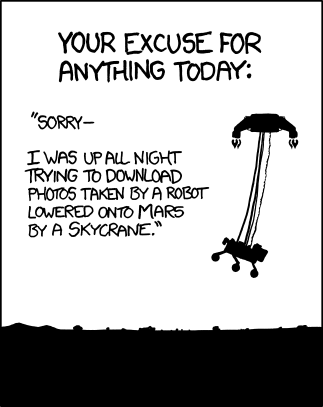I didn’t last until 1:30 EDT this morning, but this is still worth sharing

An awesome accomplishment. Shows what is possible if you put in the work in math, science, and engineering classes.
I didn’t last until 1:30 EDT this morning, but this is still worth sharing

An awesome accomplishment. Shows what is possible if you put in the work in math, science, and engineering classes.
Here’s a relatively short talk by Adam Savage of Mythbusters at TED-Ed on how curiosity and simple ideas lead to discovery. Savage is an excellent storyteller and these are stories worth hearing.
I’m particularly taken with his observation that it can sometimes take years before you understand why your brain holds on to a particular idea.
Â
A hat tip to the always excellent FlowingData for pointing this one out.
Â
Â
It’s no secret that I’m a fan of curiosity. Wanting to know how things work or what’s around the next corner is fundamental to being human. I’ve come across two video clips that illustrate the power of this far better than I can.
The first is a clip by the late Nobel prize winning physicist Richard Feynman. In it he talks about his drive to figure out how nature works and the need to comfortable with not knowing. He believes in the process that has been given the fancy name of “the scientific method” despite its underlying simplicity. Make a guess, work out the consequences of your guess, run an experiment to compare your guess to reality, accept what reality tells you, and revise your guess for the next iteration. It’s very powerful, once you learn how to say “I don’t know, let’s find out.”
The second clip comes from TED and shows Princeton molecular biologist, Bonnie Bassler describing her quest to understand how bacteria communicate. It’s a riveting look at how one person’s simple curiosity works in practice. Who knows, maybe she’ll get to go to Sweden some day.

John Medina is a molecular biologist bent on sharing how what we know about the brain can help us be more effective in the world at large. His central argument is that there are simple, but very important, lessons to be drawn from what science has learned in recent years about how the brain operates. Many of these lessons run counter to the practices and conventions that hold sway in our schools and organizations.
You can be pretty sure that I